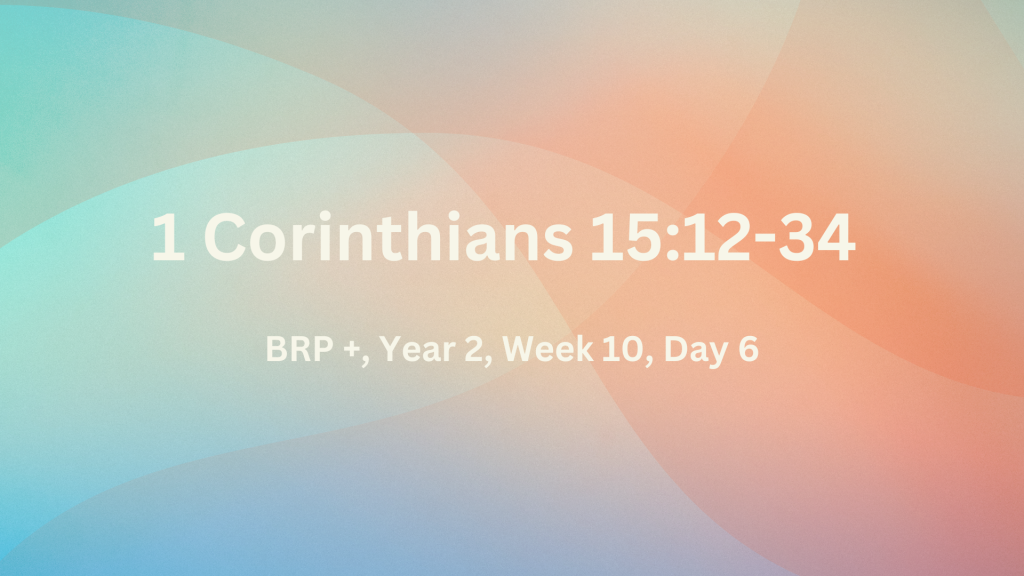1 Corinthians 15:12-34
Q.1. To what false gospel did some of the Corinthians hold? How did Paul further refute their arguments? What was wrong with their view of the gospel? Why was their teaching so depressing? – (1 Cor.15:12-19)
It becomes apparent why Paul had recorded the witnesses to the resurrection of Jesus from the dead (see 1 Cor.15:1-11). Some of the Corinthians preached a ‘gospel’ that claimed – that there is no resurrection from the dead (1 Cor.15:12 c.f. Gal.1:6-9). Paul went on to examine what their heresy meant. He argued that, if there is no resurrection, there is no life after death … and it follows: (i) Christ wasn’t raised either – 1 Cor.15:13. (ii) Christianity has no substance and is worthless – 1 Cor.15:14. (iii) Christian preachers are all liars – 1 Cor.15:15. (iv) Man’s obvious problem with sin has not been dealt with – 1 Cor.15:16-17. (v) The dead are lost forever – 1 Cor.15:18. (vi) Believers are utterly deluded – 1 Cor.15:19. Paul made it clear that a gospel without a resurrection is no gospel at all.
Q.2. What did Paul mean by his reference to the ‘first fruits’? Why is the resurrection crucial? What did Paul unveil about future events? What will happen after death has been abolished? – (1 Cor.15:20-28)
The seven festivals of Israel recorded in Leviticus chapter 23 have a New Covenant application (repeated in the New Testament). Christ died as the Lamb of God Who takes away the sins of the world, at the time of the Passover (see Jn.1:29; 18:28; 1 Cor.5:7). Paul also shared that – Christ has been raised from the dead, the first fruits of those who are asleep (see 1 Cor.15:20 c.f. Lev.23:9-14). What did he mean? The Festival of First Fruits was a sheaf offering made after the Feast of Unleavened Bread. It was a faith offering, expressing the belief that there would be a harvest. This harvest offering took place seven weeks (on the fiftieth day = Greek: Pentecost) later on the day of Pentecost. In the New Testament, Jesus rose three days after He died as the Passover Lamb. He was the guarantee that there would be other resurrections to life of believers. This happened ‘when the day of Pentecost had fully come’ (Literally: been fulfilled), and God brought in a harvest of three thousand souls (see Acts 2:1, 37-41). Before the resurrection of Jesus Christ from the dead, all sinners were under Adam’s curse of death (see Rom.5:12-21). Paul explained – 21 For since by a man came death, by a man also came the resurrection of the dead. 22 For as in Adam all die, so also in Christ all will be made alive (1 Cor.15:21-22). Since the day Christ arose, there is hope for all believers – each in his own order: Christ the first fruits, after that those who are Christ’s at His coming (1 Cor.15:23). He went on to unveil God’s eternal plan, which called for the incarnation of God’s Son. Christ’s role will continue until all God’s enemies are defeated, and then – When all things are subjected to Him, then the Son Himself also will be subjected to the One who subjected all things to Him, so that God may be all in all (1 Cor.15:28). We should not be surprised that God always had a brilliant plan. God always planned to win.
Q.3. What other groundless tradition did the Corinthians practice? Why does the resurrection make sacrificial service worthwhile? Could the gospel of these Corinthians inspire holy living? – (1 Cor.15:29-34)
The Corinthians came up with the groundless tradition of baptisms for people who had died. Did Paul advocate baptizing a substitute believer in place of those who had died? No. Baptism must reflect a genuine surrender and faith in Christ, or else it is of no value. He used their false practice to highlight their hypocrisy and stupidity of their reasoning. After all, why would you baptize for dead people if there is no resurrection? (see 1 Cor.15:29). He further reminded them of all the sacrifices he had made for the furtherance of the gospel, and argued that – If from human motives I fought with wild beasts at Ephesus, what does it profit me? If the dead are not raised (1 Cor.15:32 c.f. 1 Cor.15:30-31). He then addressed the damage that a gospel without hope would have on their morality and holy living. We might just as well – eat and drink, for tomorrow we die (1 Cor.15:32). He warned the Corinthians to avoid such false teachers and added – Do not be deceived: Bad company corrupts good morals (1 Cor.15:33). Finally, he urged them to think about the consequences of this phony gospel, and to turn away from sin (see 1 Cor.15:34).

